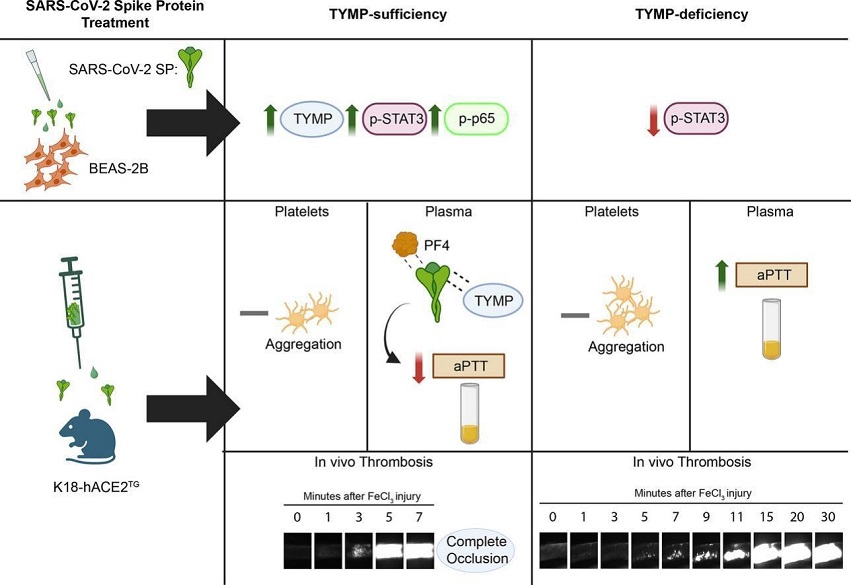Thymidine Phosphorylase Identified as Key Driver of Spike Protein Induced Blood Clots in COVID-19
Nikhil Prasad Fact checked by:Thailand Medical News Team Oct 19, 2024 1 year, 1 month, 2 weeks, 5 days, 7 hours, 50 minutes ago
Medical News: To date, several prominent American institutions has uncovered an alarming link between the SARS-CoV-2 spike protein and the formation of dangerous blood clots. A news research, conducted by scientists from Marshall University-USA and the University of Kansas Medical Center-USA, reveals that a specific enzyme called thymidine phosphorylase (TYMP) plays a crucial role in how the virus spike protein (SP) enhances blood clotting. This
Medical News report delves into the findings, offering insight into a potentially life-saving discovery. The results could pave the way for new treatments aimed at mitigating COVID-19's severe cardiovascular effects.
 Thymidine Phosphorylase Identified as Key Driver of Spike Protein Induced Blood Clots in COVID-19
The Link Between COVID-19 and Blood Clots
Thymidine Phosphorylase Identified as Key Driver of Spike Protein Induced Blood Clots in COVID-19
The Link Between COVID-19 and Blood Clots
Since the early days of the COVID-19 pandemic, doctors have noted that severe cases often result in abnormal blood clotting. Known as thrombosis, this condition has been linked to various serious complications, including heart attacks and strokes, even in patients with mild symptoms. While the mechanisms behind these clots have remained somewhat unclear, this study provides critical insights.
SARS-CoV-2, the virus that causes COVID-19, carries a spike protein on its surface that allows it to enter human cells by attaching to ACE2 receptors. Researchers have now discovered that this spike protein can also promote blood clot formation through its interaction with thymidine phosphorylase, a protein that is naturally involved in platelet function.
Study Details and Findings
In this study, the researchers used genetically modified mice, known as K18-hACE2TG mice, which have been used to replicate human responses to SARS-CoV-2. These mice were treated with a spike protein sample to observe how it would affect blood clot formation.
The results were eye-opening. Mice exposed to the spike protein showed a significant increase in arterial thrombosis, or clot formation. When the researchers looked closer, they found that this effect was directly tied to the presence of thymidine phosphorylase. Mice genetically modified to lack thymidine phosphorylase did not experience the same increased clotting when exposed to the spike protein, highlighting the critical role of this enzyme.
Interestingly, when the researchers used a drug called tipiracil to inhibit thymidine phosphorylase, they saw a dramatic reduction in the spike protein's ability to enhance clot formation. This finding suggests that targeting thymidine phosphorylase could be a novel approach for preventing blood clot-related complications in COVID-19 patients.
How Does Thymidine Phosphorylase Contribute to Clot Formation?
The enzyme thymidine phosphorylase is known to promote platelet activation, a key step in the clotting process. Platelets are small blood cells that clump together to form clots and stop bleeding. However, in diseases like COVID-19, this process can go awry, leading to dangerous
clots.
The researchers found that thymidine phosphorylase does not work alone. It forms a complex with another protein called platelet factor 4 (PF4). When the spike protein from the virus is introduced into the system, it enhances the interaction between thymidine phosphorylase and PF4, further promoting clot formation. This process happens without affecting platelet aggregation (clumping together of platelets), but it significantly increases platelet adhesion to fibrinogen, a protein that helps form clots.
Moreover, the study showed that the spike protein binding to PF4 may explain why some COVID-19 patients develop what is known as vaccine-induced immune thrombotic thrombocytopenia (VITT), a rare but serious condition linked to certain COVID-19 vaccines.
Spike Protein’s Impact on the Body’s Clotting System
Aside from its direct effect on platelet activation, the spike protein was found to shorten the activated partial thromboplastin time (aPTT), a test that measures how long it takes blood to clot. This indicates that the spike protein affects the body’s coagulation system, making it easier for clots to form.
Notably, the study also found that the spike protein’s clotting effects were amplified by its ability to bind with PF4 and thymidine phosphorylase. The researchers used advanced techniques to demonstrate that the spike protein increases its association with these proteins, enhancing the formation of the clot-promoting complex.
Therapeutic Implications
The discovery that thymidine phosphorylase plays such a pivotal role in the spike protein’s pro-thrombotic effects opens the door for new treatments. Inhibiting this enzyme could prevent severe clotting complications in COVID-19 patients and potentially in individuals who have received certain types of COVID-19 vaccines.
Tipiracil, the drug used in the study to inhibit thymidine phosphorylase, has already been approved for other medical uses, which means it could be repurposed to treat COVID-19 patients at risk for thrombosis. The study’s authors suggest that further research should be done to investigate this potential treatment avenue.
Conclusions
This groundbreaking study sheds light on the molecular mechanisms that drive blood clotting in COVID-19 patients. It reveals that the SARS-CoV-2 spike protein enhances clot formation by interacting with thymidine phosphorylase and platelet factor 4, forming a complex that boosts platelet adhesion and accelerates clot formation.
Importantly, the researchers found that inhibiting thymidine phosphorylase could stop the spike protein from causing enhanced clotting, offering hope for new therapies to prevent severe COVID-19 complications.
As COVID-19 continues to affect millions worldwide, understanding how to prevent these dangerous clotting events is more crucial than ever. The discovery of thymidine phosphorylase’s role in this process is a significant step forward in that effort.
The study findings were published in the peer-reviewed journal: Thrombosis Research.
https://www.sciencedirect.com/science/article/pii/S004938482400327X
For the latest COVID-19 News, keep on logging on to Thailand
Medical News.
Read Also:
https://www.thailandmedical.news/news/german-scientists-uncover-how-sars-cov-2-s-spike-protein-influences-blood-clotting-and-immune-response
https://www.thailandmedical.news/news/doctors-warn-of-hidden-threat-of-covid-19-involving-portal-vein-thrombosis
